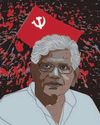
A while back, my husband and I rode in a custom-built submarine, 400m below the surface of the ocean. The experience was both awe-inspir-ing and humbling. To know that a bubble of thick acrylic and some metal was all that kept us alive, I imagine this is what astronauts feel like. The bottom of the ocean is as strange, beautiful and inhospitable as outer space, but that does not keep us from wanting to visit it.
That same drive to risk our lives by exploring the unknown is what carries us beyond the earth’s atmosphere. Science fiction loves the idea of humanity settled beyond our planet—to boldly go to new frontiers, to sail the solar winds as we once did across the seas, and to establish families and cultures in a new land. Reality, unfortunately, has shown that the analogy fails in many ways. Space is far more hostile than the ocean or an uninhabited island. For humanity to successfully expand off our home planet, we will need to solve some fundamental issues of biology and physics, and those solutions will determine when and how we settle in other parts of the solar system.
Cosmic and solar radiation will be the greatest challenges for our bodies. Exposure to these leads to all kinds of physiological problems, which we are still in the process of discovering as astronauts spend more time on the International Space Station. On the other hand, biotechnology is booming and a combination of genetic engineering and nano-scale devices may be able to counteract the detrimental effects of radiation in the future.
Denne historien er fra September 22, 2019-utgaven av THE WEEK.
Start din 7-dagers gratis prøveperiode på Magzter GOLD for å få tilgang til tusenvis av utvalgte premiumhistorier og 9000+ magasiner og aviser.
Allerede abonnent ? Logg på
Denne historien er fra September 22, 2019-utgaven av THE WEEK.
Start din 7-dagers gratis prøveperiode på Magzter GOLD for å få tilgang til tusenvis av utvalgte premiumhistorier og 9000+ magasiner og aviser.
Allerede abonnent? Logg på

A golden girl
One of India's most formidable beauties passed away earlier this month. The odd thing is she would absolutely hate this obituary; she hated being written about and avoided publicity for all of her nine decades. Indira Aswani was 93 when she died. But anyone who encountered her, even briefly, was in such awe of her grace and poise, and one could not but remember her forever.

The interest in wine is growing delightfully in India
The renowned British wine writer and television presenter Jancis Robinson, 74, recently came to Delhi and Mumbai to reacquaint herself with India's wine industry. This was the Robinson's fourth visit to India; the last one was seven years ago. On this trip, Robinson and her husband, restaurateur Nicholas Lander, were hosted by the Taj Hotels and Sonal Holland, India's only Master of Wine.

United in the states
Indian-Americans coming together under the Democratic umbrella could get Harris over the line in key battlegrounds

COVER DRIVE
Usage-driven motor insurance policies offer several benefits

GDP as the only measure of progress is illogical
Dasho Karma Ura, one of the world's leading happiness experts, has guided Bhutan's unique gross national happiness (GNH) project. He uses empirical data to show that money cannot buy happiness in all circumstances, rather it is family and health that have the strongest positive effect on happiness. Excerpts from an interview:

India is not a controlling big brother
Prime Minister Tshering Tobgay considers India a benevolent elder sibling as the \"big brotherly attitude\" is happily missing from bilateral ties. He thinks the relationship shared by the two countries has become a model of friendship not just for the region, but for the entire world. \"India's attitude is definitely not of a big brother who is controlling and does not allow the little brother to blossom and grow,\" says Tobgay in an exclusive interview with THE WEEK.

Comrade with no foes
Lal Salaam, Comrade Yechury-you were quite a guy!

Pinning down saffron
In her first political bout, Vinesh Phogat rides on the anti-BJP sentiment across Haryana

MAKE IN MANIPUR
Home-made rockets and weapons from across the border are escalating the conflict

SAHEB LOSES STEAM
Coalition dynamics and poor electoral prospects continue to diminish Ajit Pawar's political stock